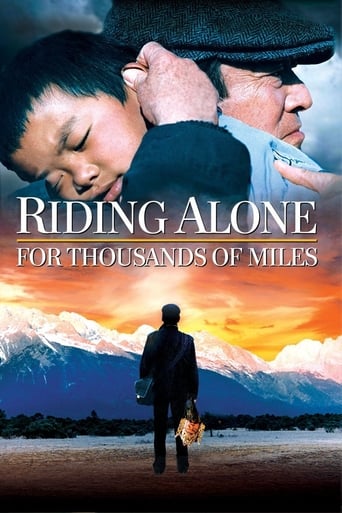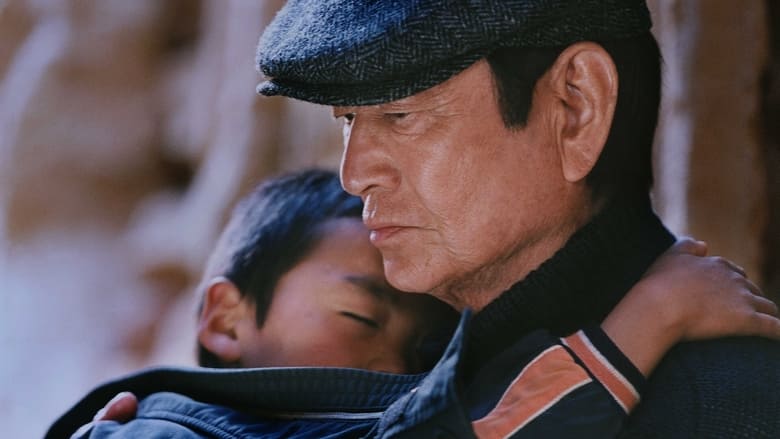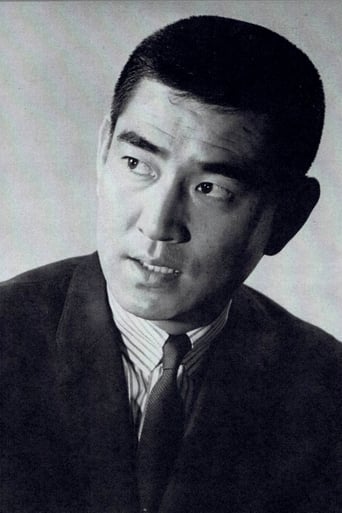Riding Alone for Thousands of Miles (2006)
Takada, a Japanese fisherman has been estranged from his son for many years, but when the son is diagnosed with terminal cancer his daughter-in-law, Rie, summons him to the hospital. Through a series of obstacles and relationships, he is brought unexpectedly closer to both an understanding of himself and of his son.
Watch Trailer
Cast


Similar titles
Reviews
So much average
This story has more twists and turns than a second-rate soap opera.
It's a good bad... and worth a popcorn matinée. While it's easy to lament what could have been...
I didn’t really have many expectations going into the movie (good or bad), but I actually really enjoyed it. I really liked the characters and the banter between them.
Zhang Yimou, mostly known for his martial art and SIG films, takes on a different approach to his film Riding Alone for Thousands of Miles. It tells the story of a Japanese fisherman, Takada, who's son has an incurable disease. Takada wants to redeem himself and receive forgiveness from his son. He sets out on a journey to China to film a Chinese folk Opera, Riding Alone for thousands of miles, which his son wanted to go back and film. On his journey Takada learns about his son and about himself. He realizes that although he is in a different culture, everyone is connected, which helps him understand the love for a child. In this film we see that Zhang Yimou films both China and Japan different. The different textures, and color tones distinguish both cultures.
Riding alone for thousands of miles makes you reflect your relation ship between a parent(s). The movie was intimate, moving, and personal. portraying the relationship between father and son may be great to some or not. It encounters that all feelings are not subjective. whatever relationship you have with your own family members, watching this movie tells you that you're not much different from each other. The movie was really touching because even though there was a language barrier between the Japanese and Chinese, they worked hand in hand. showing that diversity does not matter. The movie can really hit you and make you think upon your own life. very real and well made movie.
Yimou Zhang marks the beauty of cultural traditions and differences. I found it very interesting how Yang Yang and Mr. Takata communication with different languages. There was a beautiful connection between them and how they came understand one another. Mr. Takata, an elderly man who is quite stubborn and reserved, traveled to China from Japan to videotape a Chinese folk opera singer, Li Jiamin for his son, Kenichi, whom he had neglected after his wife's death. I found it very fascinating how he had to go to China to get to know his son, Kenichi. He had a few decades to talk to his son but everything changed once he had learned that Kenichi was very ill and hospitalized. The power of a man and his son reconnecting again brings this story to a whole different level. This situation made you realize how you can know someone for years and realize you never really knew them at all.At first, I thought this was going to be a simple movie about a man's quest to reunite with his son and ultimately end up doing so, but you will not find the typical Hollywood movie ending here. Throughout the film, Mr. Takata is determined to meet a Chinese folk opera star, Li Jiamin in order to record him performing for his opera loving son. As the man's trip progresses, he crosses paths with villages who help him along his journey to find Li Jiamin and complete his objective. Mr. Takata and the audience both do not expect to get more out of the trip than originally plan. I could not imagine what was going to happen as the story unfolded. When Mr. Takata finally gains access to meet a now prisoner, Li Jiamin, the guards try to force Li Jiamin to perform but he is not stable and breaks down crying because he misses his son, Yang Yang, whom he has never met.Mr. Takata makes a big decision and decides he wants to bring these two together, perhaps because he knows this is the only way Li Jiamin was agree to perform. On the day Mr. Takata and Yang Yang were suppose to meet with Li Jiamin, Yang Yang runs away and hides somewhere within the mountains. Mr. Takata finds him but they are stuck together for the night until they can find help in the morning. During their time alone, Yang Yang becomes hostile towards Mr. Takata but the two eventually befriend one another. Mr. Takata expresses how he feels holding Yang Yang as if he were his son. The next day the police and villagers spread out into the mountains and find the two. When Mr. Takata learns that Kenichi is passed away, he still continues on his journey and returns to the prison to meet with Li Jiamin again. He asks Yang Yang if he wants to meet his father even after the villagers spoke for him and were forcing him to go with Mr. Takata but Mr. Takaka realizes that even as a child, he is allowed to make his own decisions just as Kenichi made his decision to not see his father, which is similar to how Li Jiamin did not want to perform but the guards tried to force the request. Yang Yang does not want go with Mr. Takata to the prison.I think one of the themes of the film was to ''Redeem yourself'' as heard in the prison. In the end, out of selflessness, respect, thankfulness, Mr. Takata did not ask Li Jiamin to perform and instead showed him pictures of his adorable son, which was an even bigger gift than anyone had expected because it brought another father and son together. Many of the prisoners were also touched by this gift. Li Jiamin felt very thankful he vowed to give Mr. Takata his best performance.
Of all the international films that I have had the opportunity to view thus far, this one has had the most reflective components. Riding Alone for Thousands of Miles shows us the importance love, maintaining good relationships with both family and friends and the concept of time.The story is simplistically executed but powerful nonetheless. Zhang Yimou has carefully crafted a stunning film portraying the differences between the Japanese and the Chinese culture. The use of cinematic mechanisms also contributes to the dramatic nature of the film.This film will leave you with lifetime lessons about life and its core principles. There are no magical or exaggerated computer representations but simple, pure and effective shots that leave striking images in your mind.



















